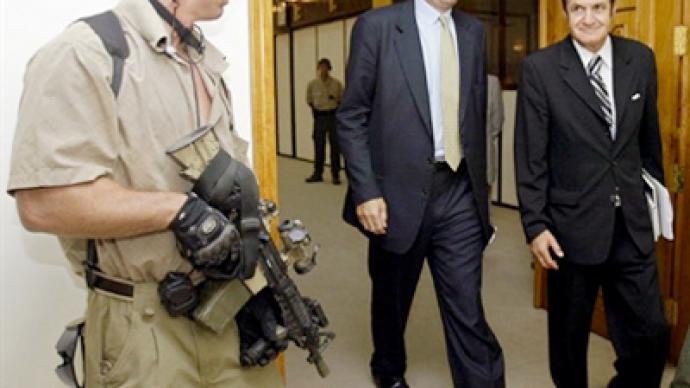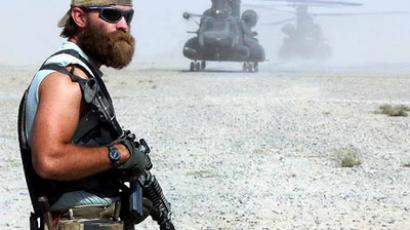Libya: blood bonanza for contractors

Libya might soon turn into a goldmine for private security firms. Reports say that the UK is already hiring mercenaries to protect the interests of the big corporations there, once Colonel Gaddafi goes.
But the fresh history of the previous NATO-led interventions in Iraq and Afghanistan give a pretty clear picture of how exactly the big men with guns could turn this civil war-torn country into a proper Wild West.To the world, homeless and displaced people, disrupted water and electricity supplies, and decimated infrastructure might be tragic scenes of the destruction of lives, while to Britain’s large private security sector they are nothing but a gold mine.In 2009, the UK’s Ministry of Defense spent US$82 million on hiring private security firms, and now insiders say they are hiring again – for Libya.“Let’s say after the fall of Colonel Gaddafi, you’d have this power vacuum in the country, and that’s exactly when the private military and security companies will come in,” John Hilary, Executive Director of War on Want points out. “Whereas for the rest of us and for most people these wars, these conflicts are just a cause for concern and grief, [whereas] for these companies this is a bonanza time.”Private security really boomed in Iraq, and by 2004 the global industry was estimated at US$100 billion. Formerly in the elite SAS, Bob Paxman did ten years as a contractor in Africa and Iraq, and talks about the huge sums of money involved.“You also got your hire of arms and ammunition, your training, your vehicles, your compounds so when it’s charged back to the client then all of a sudden it becomes a big money making machine,” the former SAS soldier says.Private security is an industry populated by ex-soldiers, where regulation is entirely voluntary. That has led to numerous human rights violations like the one registered on video leaked in 2005, which apparently shows a team of UK security contractors taking unprovoked pot-shots at cars on a road in Baghdad.While working undercover, Paxman says he has even had other contractors open fire on him. And that sort of behavior, particularly by younger contractors with a gung-ho attitude, can have unwelcome results.“If you’ve got lots of security contractors coming to your village, and getting paid outrageous amounts of money in comparative terms to what the locals would be paid, of course there is going to be a fair bit of friction between the groups and over the period of time that could be exploited quite easily by external groups, such as terrorist groups,” Paxman says.Security companies are typically hired by defense ministries and multinational corporations to protect people and property from insurgents. Because of the dangerous nature of the work, it can easily get out of hand.“In a world that’s trying to create a free society, where human rights are protected and the rule of law is important, you can’t have people beyond the law,” believes the Liberal Democrat Member of Parliament Mike Hancock. “And private security is I think an element where, particularly in volatile states, it does go beyond the law.”Libya increasingly looks like it will be a volatile state for a good while to come and a new conflict zone means a new cash cow for private security companies.The reality of modern warfare is that private contractors are now doing the work sovereign military forces used to do, without many of the rules and regulations that govern army engagement. That could mean a new round of human rights violations in an unstable country.And while it would be Libya that would bear the brunt of that cost, for security contractors, it only brings in more business.













